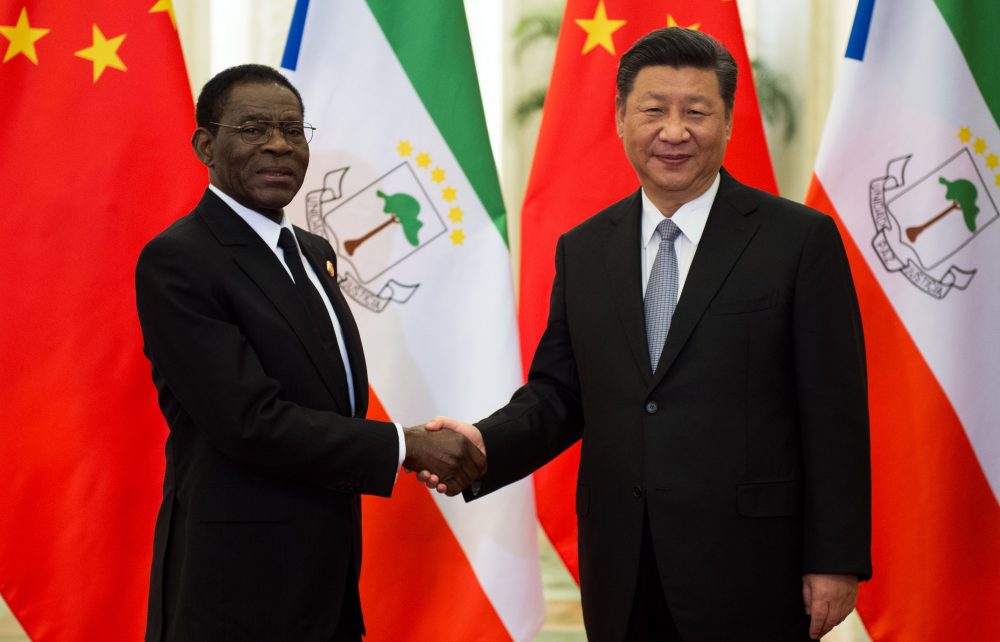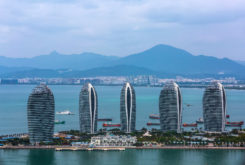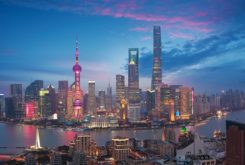Teodoro Obiang, president of Equatorial Guinea, is known to praise Chinese investors and government loans. Major Chinese construction companies have established themselves in the West African oil-producing country, a member of the Organization of the Petroleum Exporting Countries (OPEC) since 2017, as well as the Community of Portuguese Language Countries (CPLP) since 2014. But closer ties also mean occasional strains, as recent developments show.
Equatorial Guinea became, at the Second Belt and Road Forum held in Beijing 25-27 April, perhaps the biggest surprise among CPLP countries by signing a Belt and Road Initiative MoU with the Chinese government and pledging adherence to the initiative.
On 21 May, a delegation composed of executives from China’s Exim Bank, Development Bank, and Ministry of Commerce visited Equatorial Guinea to study how the projects that the country is presenting to China can be channelled within the framework of the Forum on China-Africa Cooperation (FOCAC), according to the government.
Development projects in Equatorial Guinea for the period 2019-2021 include the creation of a Special Economic Zone (SEZ), aimed at improving the investment climate and supporting the strategy to diversify the national economy.
The SEZ plan envisions the construction of storage tanks for oil products; the implementation of a chocolate and textile industry; a palm oil refinery; factories for footwear, mattresses, school supplies, toilet paper, and napkins; expansion of fibre optics, together with the introduction of industries producing soap, detergents, animal and milk processing, feed and rice, as well as the completion of the construction works of the university campuses of Malabo and Bata, the country’s two major cities.
Meeting with the minister of Foreign Affairs and International Cooperation, Simeón Oyono Esono Angüe, and minister of Finance, Economy and Planning, César Augusto Mba Abogo, the head of the Chinese delegation, Shen Xiang, director general for Western Asian and African Affairs in the Chinese Ministry of Commerce, expressed the willingness of his government to support the plan to industrialise the national economy, according to official sources.
The Joint Commission of Guinean-Chinese Cooperation is scheduled to convene in Beijing on 7 June.
In a recent and rare interview, President Teodoro Obiang told Africa Monitor that Chinese investment compared favourably with that of other countries, benefiting from a “major” US$2-billion loan from the government, that Equatorial Guinea is repaying.
The loan, he added, “does not generate state debt because it is in a parallel account in a Chinese bank, that we service according to our capabilities.”
But, according to local sources, the expanding financial ties have come under strain recently due to the treatment by Equatorial Guinea of a number of Chinese companies with growing presence in the country.
One of the main players in the construction sector is China Road and Bridge Corporation (CRBC), and allegedly preferential treatment given by the government to one of its main competitors, Moroccan group SOMAGEC, has generated discomfort among the Chinese business community.
At the centre of the issue is the fact that SOMAGEC, whose chairman, Moroccan businessman Roger Sahyoun, is known to have close ties to the Obiang family, is perceived to have been given priority in the repayment of arrears, while other foreign companies have been given less or no attention.
The complaints, our sources add, were one of the reasons behind the recent replacement of former Finance, Economy and Planning Minister Lucas Abaga Nchama, replaced in April by César Augusto Mba Abogo, who attended the end of May meeting with Chinese officials.
With an improved climate with China, Teodoro Obiang’s government expects to be able to finally capture Chinese interest and investment for the creation of the SEZ.
Public praise of Chinese companies has become frequent, more recently by the minister of Public Works, Housing and Urban Planning, Diosdado Nsue Medja, who received the outgoing general manager of China State Construction in the country, Meng Xiangguang, and awarded him an official “certificate of appreciation and congratulations” in late May.
The content of the certificate of recognition granted to the Chinese entrepreneur and signed by Prime Minister Francisco Pascual Obama Asue, recognises the work carried out during the seven years of his tenure as general manager, while at the same time highlighting the excellent bilateral relations between the two countries.
China and Equatorial Guinea have maintained diplomatic relations since 1970. Cooperation between the two countries is mainly in the economic and commercial sectors, and in infrastructure construction, favourably rated by both governments.
The new fibre-optic connection (Ceiba-2), opened in 2018, was implemented by Chinese information and communications technology (ICT) company Huawei.
As part of the strategy to diversify their network of external partners, Equatorial Guinea joined the CPLP in 2014. The country only declared Portuguese as its third official language in 2007; the overwhelming majority of the population speak Spanish as their primary language.
The CPLP membership process has been marked by tensions, above all with Portugal, which believes that the government has avoided fulfilling some of the mandatory conditions imposed by the membership agreement, namely the abolition of the death penalty.
Separately, Equatorial Guinea has also faced pressure from countries such as Spain and France to democratise the regime and ensure greater respect for human rights.
Since São Tomé and Príncipe joined Forum Macao in 2017, Equatorial Guinea is the only country from CPLP still not a member of the institution. However, sources indicate that advances towards their membership status may be confirmed by the Forum’s next Ministerial Conference in 2020 in Macao.
Equatorial Guinea’s membership in Forum Macao was suggested in 2015, prior to the 5th Ministerial Conference held in October 2016, but the membership never moved forward.
According to sources, the pressure from CPLP has further increased Equatorial Guinea’s inclination to join Forum Macao. They’ve stated that no such conditions have been imposed by the Forum when applying to become a full member.
In 2019, the prime minister of Equatorial Guinea, Francisco Pascual Obama Asue, officially visited Macao to take part in the 9th International Infrastructure Investment and Construction Forum, in which his country was represented for the third straight year as part of an effort to get closer to Forum Macao.
The agenda of the meeting between Prime Minister Obama Asue and Macao Chief Executive Fernando Chui Sai On included issues such as the Belt and Road strategy and Macao’s role in fostering relations between China and the Portuguese-speaking countries.




